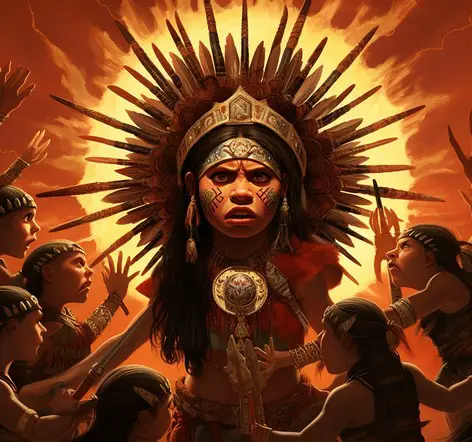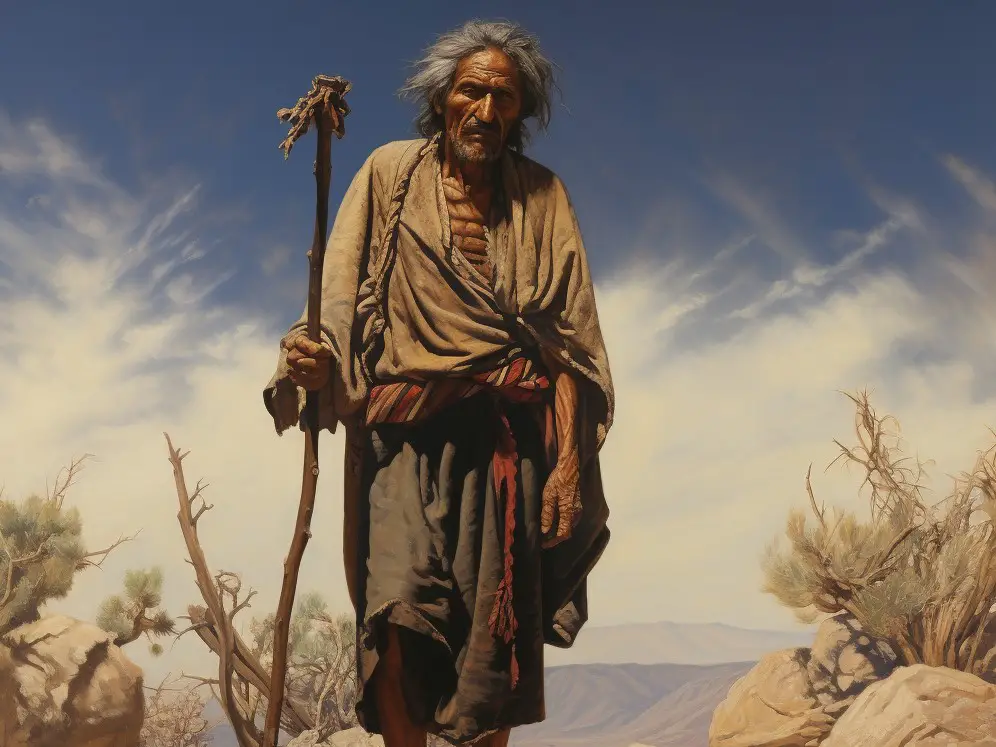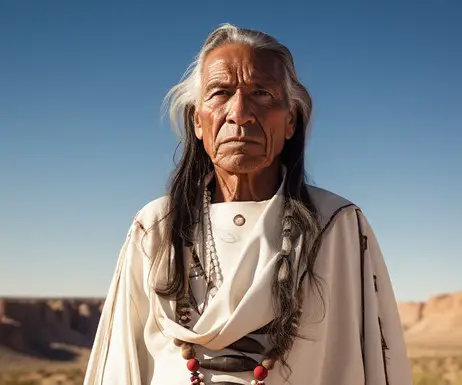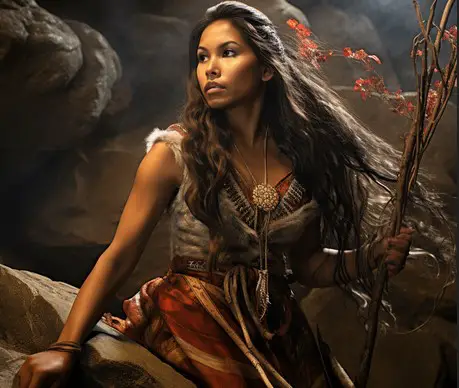Podcast: Play in new window | Download
Subscribe: Apple Podcasts | RSS
 The Yaqui or Yoeme people have lived in the river valleys of south-central Sonora in northwestern Mexico since time immemorial. The name “Yaqui” comes from the Yoeme word “Hiakim” which was the name these people gave to their homeland. The Yaqui resisted outside influence for hundreds of years and as a result much of their culture has survived into the 21st Century. Yaqui culture is full of many legends. Here are 3.
The Yaqui or Yoeme people have lived in the river valleys of south-central Sonora in northwestern Mexico since time immemorial. The name “Yaqui” comes from the Yoeme word “Hiakim” which was the name these people gave to their homeland. The Yaqui resisted outside influence for hundreds of years and as a result much of their culture has survived into the 21st Century. Yaqui culture is full of many legends. Here are 3.
- The Goddess Yomumuli and the Little People
Long before the Europeans arrived in Yaqui territory, the land was called Suré and Suré was populated by a race of little people called the Surem. The Surem were the children of the goddess Yomumuli who protected them and provided for them. The land of Suré was overabundant with animals and edible plants and the Surem people didn’t need to farm. One day a huge, thick stick appeared in the land of Suré and this stick reached from the ground all the way up to the top of the sky. This thick stick would hum like a hive of bees and all the Surem knew that the stick was trying to communicate with them, they just didn’t know what it was saying. The goddess Yomumuli was surprised at the sudden appearance of this huge stick and although she didn’t care, she knew what the stick was saying. It had appeared in the land of Surem to tell of future events and the goddess was happy to tell the Surem of the stick’s messages. The stick was telling the people and the animals how to live and what was going to happen to them in the coming generations. Specifically, the stick foretold the coming of strange new people to the land who would bring with them a new religion and a new way of ordering their lives. The goddess didn’t like these prophecies, but she  continued to translate the gigantic stick’s messages to her people. Over time the Surem did not believe that the goddess Yomumuli’s translations were accurate, and this hurt the feelings of the goddess. She knew that everything the gigantic stick was saying was going to come true. So, in anger, the goddess left the land of Suré, and took a bountiful river with her. She just folded it up and put it under her arm, telling everyone that she was heading north. When the day came when Yomumuli finally went through with her promise to abandon the little people, they began to believe in all the prophecies of the big stick. They did not want to be conquered. They did not want new gods or a new order of life. So, the ones who wanted to continue with the old ways decided to live under the earth, inside the hills or they went to live in the ocean. Only a few people liked what the stick was predicting for them, and those people remained on the land, eventually growing taller and stronger to meet the challenges of the future. These taller and stronger little people became the Yaqui tribe. The little people still exist today, living in the hills, under the earth and in wild areas and their spirits help the Yaqui people in the modern world. No one knows what happened to the gigantic stick, however.
continued to translate the gigantic stick’s messages to her people. Over time the Surem did not believe that the goddess Yomumuli’s translations were accurate, and this hurt the feelings of the goddess. She knew that everything the gigantic stick was saying was going to come true. So, in anger, the goddess left the land of Suré, and took a bountiful river with her. She just folded it up and put it under her arm, telling everyone that she was heading north. When the day came when Yomumuli finally went through with her promise to abandon the little people, they began to believe in all the prophecies of the big stick. They did not want to be conquered. They did not want new gods or a new order of life. So, the ones who wanted to continue with the old ways decided to live under the earth, inside the hills or they went to live in the ocean. Only a few people liked what the stick was predicting for them, and those people remained on the land, eventually growing taller and stronger to meet the challenges of the future. These taller and stronger little people became the Yaqui tribe. The little people still exist today, living in the hills, under the earth and in wild areas and their spirits help the Yaqui people in the modern world. No one knows what happened to the gigantic stick, however.
- The False Beggar
Abahta Chaheme was a strong and healthy man, but he pretended to be old, and dressed as a beggar. The man went to other villages in this disguise and asked for charity. Abahta Chaheme had a grown daughter named Wokkoi Masa. Abahta Chaheme wanted for nothing as he had much livestock, and his land was plentiful, but he continued  begging in other Yaqui villages pretending to be a homeless and destitute vagabond. Those who took pity on him gave him corn. Others would give him a baby animal or two which he would take back to his comfortable homestead. These generous donations added to his riches. One day a young man came to his house. This man was an expert hunter and knew how to tan hides. He made clothing out of animal skins and traded them for everything he needed in life. This man’s name was E’esuki. This man fell in love Wokkoi Masa the daughter of the fake beggar and she also loved him very much. The young man, E’esuki, talked with Abahta Chaheme and asked his permission to marry his daughter.
begging in other Yaqui villages pretending to be a homeless and destitute vagabond. Those who took pity on him gave him corn. Others would give him a baby animal or two which he would take back to his comfortable homestead. These generous donations added to his riches. One day a young man came to his house. This man was an expert hunter and knew how to tan hides. He made clothing out of animal skins and traded them for everything he needed in life. This man’s name was E’esuki. This man fell in love Wokkoi Masa the daughter of the fake beggar and she also loved him very much. The young man, E’esuki, talked with Abahta Chaheme and asked his permission to marry his daughter.
“Yes, I grant you permission,” Abahta Chaheme said, “but you must give up your hunting and clothing making to support yourself do what I do.”
“What do you want me to do?” asked E’esuki.
“Dress up as a poor man,” he began, “pretend you are very old, use a cane, carry skin bags on your neck and shoulders and wander around for six months, begging at all the villages and ranches. After these six months, then you may marry my daughter.”
The young man disagreed and told Abahta Chahema that he could well provide for his daughter without having to beg for charity across the countryside. He planned on continuing his livelihood and would clothe his new bride in the most beautiful of animal skins.
“Then you are not going to marry my daughter,” Abahta Chahema exclaimed. “You need to agree to what I proposed, or the deal is off.”
E’esuki replied: “I do not even know how to beg people for things. There’s never been a need for me to do such a thing because I am an expert hunter. Every day I can have fresh meat if I want it.”
“Well,” the old man continued, “if you love my daughter like you say you do you will learn how to beg and bring home your take to me.”
The young man, E’esuki, did not want any part of this bargain, so he left the comfortable homestead of Abahta Chahema and his beautiful daughter. Within three days’ time, though, he returned and asked the old man again if he would let him marry his daughter. Abahta Chahema told the young man that he wouldn’t allow it unless he agreed to beg.
The young E’esuki could not live without the lovely Wokkoi Masa, so he agreed to the six month deal of begging across the countryside and returning with his take.
Abahta Chaheme then helped E’esuki dress up like a beggar, cane and all, and sent him off on his six-month quest.
E’esuki was so successful at begging that he gathered for himself much more goods and many more animals than he had while working as a hunter and maker of clothing. He finished his six months and returned to Abahta Chaheme, to live happily ever after with the beautiful Wokkoi Masa.
The old man granted his permission and told E’esuki that now he must return to his livelihood of hunting and tanning.
“But I don’t want to go back to my old way of making a living,” E’esuki protested. “It was a lot of work and I got so very little out of it. This begging business is far more lucrative. I want to marry your daughter and continue begging to support her.”
“No,” said Abahta Chaheme. “No son-in-law of mine will be a common beggar. Either you return to your normal lines of work, or you can’t marry Wokkoi Masa.”
“Well, then, I won’t marry her,” the young man replied. “The life of begging is so good that I would rather live alone.”
“You made up your mind,” Abahta Chaheme said, “You can’t have my daughter.”
“Okay, fine,” E’esuki said, and he just turned around and left.
The young man continued asking for charity, no longer hunting or making clothing out of hides. He became very rich and died a very wealthy, albeit unmarried old man.
The girl also never married.
No one knows what happened to Abahta Chaheme, but it is believed that he also died like his protégé, very wealthy and alone.
- The Yaqui Magic Wands
 A man named Cho’oko Baso lived with his sons near a hill called Maatale. He made his living by collecting bark from certain trees which he would make into dyes to tan hides. He would trade the dyes for fruit, roots and meat so he could feed his sons. It was a nice livelihood and Cho’oko Baso was content with his living situation. One day he was walking far from home scavenging for bark, and it was getting late in the day. Near an unfamiliar cliffside he saw a white light, but it wasn’t at a house because he couldn’t see windows or a door. Curious, Cho’oko Baso stood near this cliff for some time trying to figure out the source of the light. Suddenly, an older man in a long white shirt, a sort of tunic, appeared. The old man asked Cho’oko Baso what he was hunting for, and he explained that he was looking for bark to use in his dye-making business.
A man named Cho’oko Baso lived with his sons near a hill called Maatale. He made his living by collecting bark from certain trees which he would make into dyes to tan hides. He would trade the dyes for fruit, roots and meat so he could feed his sons. It was a nice livelihood and Cho’oko Baso was content with his living situation. One day he was walking far from home scavenging for bark, and it was getting late in the day. Near an unfamiliar cliffside he saw a white light, but it wasn’t at a house because he couldn’t see windows or a door. Curious, Cho’oko Baso stood near this cliff for some time trying to figure out the source of the light. Suddenly, an older man in a long white shirt, a sort of tunic, appeared. The old man asked Cho’oko Baso what he was hunting for, and he explained that he was looking for bark to use in his dye-making business.
“There’s no need to work so hard,” the old man explained, “just take this little stick and touch that rock over there.”
Cho’oko Baso did as the old man suggested and the rock opened before him.
A beautiful young girl came out of the rock and said this to him: “Now, take this stick. Whenever you need anything, whether it is food, money, animals, or whatever, it will be given to you.”
Cho’oko Baso took the stick, the rock closed up, and both the beautiful girl and the old man disappeared. From that day on, Cho’oko Baso was very rich because the magical stick granted him his every wish.
 After some twenty years of living a life of endless wealth and abundance, Cho’oko Baso was passing by that same place by the cliff and the same old man appeared to him. The old man told him to go over to the same rock that the girl came out of twenty years before.
After some twenty years of living a life of endless wealth and abundance, Cho’oko Baso was passing by that same place by the cliff and the same old man appeared to him. The old man told him to go over to the same rock that the girl came out of twenty years before.
“Do what you did the last time,” the old man said, “and touch that rock with the stick.”
Cho’oko Baso followed the old man’s instructions with a sense of excitement and anticipation. He wondered how much more wealth he would be given by these magical strangers. Cho’oko Baso touched the rock and the young woman appeared as she did before.
The beautiful girl smiled and said, “Come in.”
Cho’oko Baso went inside the rock, and no one ever saw him again.
REFERENCES
Warner Giddings, Ruth. Yaqui Myths and Legends. Self-published in 1959. Accessed at forgottonbooks.com.
